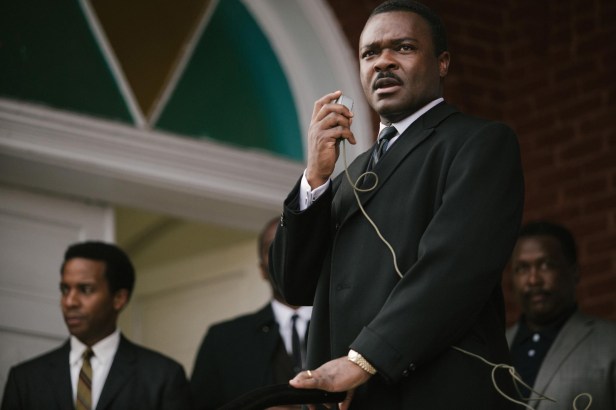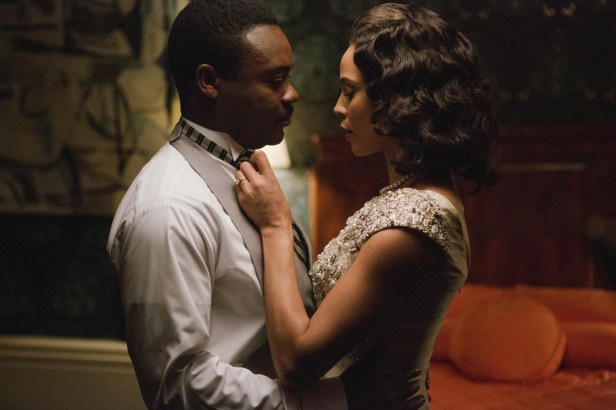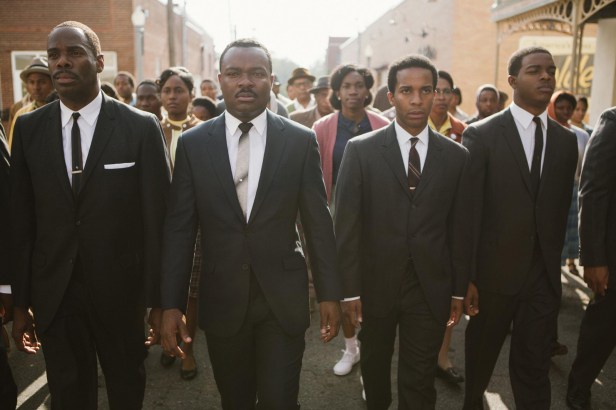Selma (2014)
One dream can change the world.
In the spring of 1965, a series of unforgettable events changed the course of civil rights in America forever as a band of courageous marchers, led by Dr. Martin Luther King Jr., attempted to carry out a peaceful procession from Selma, Alabama to Montgomery, Alabama — three times no less— on a campaign to secure their fundamental human right to vote. Their final march from Selma to Montgomery culminated in President Johnson signing the Voting Rights Act of 1965, one of the most significant victories for the civil rights movement. However, the tumultuous human story of this three-month period — from the political battles in the halls of power, to the faith and upheaval that transpired from those out on the street — has surprisingly never before been adapted to film.

Fortunately, director Ava DuVernay’s Selma brings the trials and tribulations of the hard-won moment of long awaited justice to life with an uncompromising vision, presenting Dr. King (David Oyelowo) as a flesh-and-blood man with flaws and uncertainties. As the 50th Anniversary of the events it depicts approaches, the Oprah-endorsed film chronicles a string of dealings including the intense adversarial relationship between Dr. King and President Lyndon B. Johnson (Tom Wilkinson), the disturbing involvement of the FBI — who ‘apparently’ tracked Dr. King’s every move — and the resilient spirit of the ordinary men and women who sacrificed all by uniting for their voting rights throughout this unsettling period of American history. The film also documents the journey of a man, Dr. Martin Luther King Jr., trying to contend with countless doubts and many daunting obstacles, not just towards leadership, but en route for the togetherness required to make a change in the world. As director DuVernay, Middle of Nowhere (2012), states, ‘Selma is a film about voice; the voice of a great leader; the voice of a community that triumphs despite turmoil; and the voice of a nation striving to grow into a better society.’
Selma benefits chiefly from first-rate performances, a gifted cast, and some devastating scenes depicting the retaliation between African-Americans and Caucasians in the struggle for voting rights equality. British actor David Oyelowo, Interstellar (2014), delivers a sterling performance as Dr. Martin Luther King Jr. — who was just 36 years of age in 1965 — packing on pounds and razoring his hair to match King’s familiar silhouette, whilst perfecting King’s expressiveness in the art of charismatic speech-making, ultimately delivering a portrait of a man fueled by fortitude and fire, bolstered by the determination of the people around him. Here, Oyelowo reminds us of a hero who used Christian faith to battle injustice on the streets and in the hallways of political power. Although Oyelowo carries the weight of the picture on his shoulders, several other performances cannot be ignored, including Tom Wilkinson’s, Michael Clayton (2007), strong portrayal of President Lyndon B. Johnson, Carmen Ejogo, The Purge: Anarchy (2014), as King’s long-suffering wife, Coretta Scott King, and Oprah Winfrey, Lee Daniels’ The Butler (2013), as stubborn voting rights protester Annie Lee Cooper, who refused to give up in her efforts to register as a voter.

Perhaps my chief complaint with Selma is in its casual regard in relation to explaining the picture’s historical context, as most of us are far from being history scholars. For instance, the film opens with Dr. King receiving the Nobel Peace Prize in Oslo and then moves onto showing an explosion that claimed the lives of four adolescent African-American girls at the 16th Street Birmingham Church in 1963, yet we’re told little about this tragic incident — or its significance in the film until later on — as writer Paul Webb and director DuVernay skip details and specifics, rapidly moving onto the next scene, where we find ourselves at King’s first strategy session with his lieutenants, discussing a suitable place to launch his next protest; this is just one example in a handful of other such moments. Furthermore, the picture’s historical accuracy is rather questionable, particularly its depiction of President Lyndon B. Johnson and his relationship with King. Many believe that President Johnson was a champion of civil rights legislation and a proactive partner of King, whereas the film is accused of falsely depicting the President as a reluctant or obstructionist political actor who had the FBI monitor and harass King; director DuVernay has hit-back at these comments by stating that the movie is ‘not a documentary,’ affirming ‘I’m not a historian. I’m a storyteller.’
Even so, the struggles that African-Americans contended with during this era are shown in vivid detail — from beatings to shootings — and we learn a bit about Dr. King’s associates, James Bevel (Common), Rev. Horsea Williams (Wendell Pierce), John Lewis (Stephan James) as well as some of the women who campaigned alongside the celebrated male leaders, women such as Amelia Boynton (Lorraine Toussaint), Annie Lee Cooper and Diane Nash (Tessa Thompson). At times though, Selma is reduced to great men arguing in rooms — Dr. King and his advisers argue; Dr. King and President Lyndon B. Johnson argue, and President Lyndon B. Johnson and segregationist Alabama governor George Wallace (Tim Roth) argue — but amongst the chatter, DuVernay hammers home some salient points. A scene where racist rednecks assault a white Boston priest and beat him to death is rather chilling, as is the painstaking recreation of the march at the Edmund Pettus Bridge.

Alas, numerous scenes where King is seen delivering powerful speeches regarding civil rights were all reworked and paraphrased as the Martin Luther King estate had already licensed King’s words to Dreamworks and Warner Bros. back in 2009 for a biopic that director Steven Spielberg hopes to eventually produce. Nevertheless, Selma looks great thanks to director of photography, Bradford Young, Ain’t Them Bodies Saints (2013), and production designer Mark Friedberg, Noah (2014), who have clearly immersed themselves in the Alabamian landscape, both of past and present. Let’s not forget about the feature’s theme ‘Glory,’ performed by Common and John Legend, which will no doubt leave a lasting impression as the flick’s credits roll.
Despite its flaws and its largely conventional approach, Selma deserves to be seen in today’s contemporary climate, as the feature is uniformly topical and relevant. With a terrific cast and a dedicated and fervent director at its helm, the film passionately chronicles just how far America has come since race relations in the 1960s without ever shying away from how much further America — and the world — must go to maintain this equality.
4 / 5 – Recommended
Reviewed by Mr. Movie
Selma is released through Studio Canal Australia
A very heartfelt movie that seems to come from a very angry place. However, it never bashes anybody in particular, which is probably it works as well as it does. Good review.
You’re spot-on as usual Dan!!
I like the review. I’m a little put out they’ve changed certain characters and events but this still looks like one I need to check out.
I’d definitely recommend it, regardless of its changes!
I watched it not too long ago and it was so good, worthy of its praise and robbed at the Oscars. I don’t think the controversy surrounding LBJ’s portrayal was anywhere near as bad as the media made it out to be.
I totally agree 🙂
Loved this movie! I liked that MLK isnt a perfect man. It made me feel like I could make a difference too.
My only nitpick is why does Hollywood seem to always cast Brits as Southerners? The accents tended to wander
I thought the film was great and David Oyelowo did a terrific job in the lead! Thanks for reading!